


Against the background of a developing economy and a low degree of technical development, the education sector may be one of the most vulnerable in Georgia amid the conditions created by the COVID-19 pandemic and distance learning requirements. The aim of this project is to assess existing challenges and offer recommendations regarding possible measures to tackle them to stakeholders.
Considering Pisa Scores (70th out of 78 countries), Georgia’s education sector performance is quite disappointing. General problems in the sector include: Ageing of teachers in public schools and low wages in the sector, which decreases popularity of teaching; Poor technical equipment in schools and lack of training possibilities for respective personnel; high share of population living below the national poverty line and lacking access to the necessary literature or other learning materials are all core challenges in the sector. Additionally, the COVID-19 pandemic and subsequent lockdowns and safety regulations have led to decreased duration of classes and efficiency of the studying process.
Implementation of strategic planning in education is vital because education is an investment in human capital, and it is important for the sustainable economic development, financial stability, social well-being, and prosperity of our country. High-quality education promotes well-being and is a necessary prerequisite for personal, social, and professional development. To achieve these goals, the education system must be accessible to all and provide all citizens of the country with the opportunity to achieve high-quality sustainable outcomes.
To examine the above-mentioned problems and increase the quality and coverage of public services during and after the pandemic, the project team has implemented the following activities during the research process:
- The research team has conducted sector preliminary analyses and developed a research structure. Collected data was used for the quantitative and qualitative analysis of the sector.
- The project team has developed 22 different FOI Requests related to the implemented regulations, study process, teacher’s trainings, and related costs during the COVID-19 pandemic. FOI requests was sent to four public organizations: Ministry of Education, Science, Culture and Sport (MES); Education Management Information System; Teachers Development National Centre, and Georgian Public Broadcaster.
- To evaluate government actions in response to the COVID-19 pandemic and analyze financial costs before and during the pandemic period, the research team has started monitoring the spending of Ministry of Education, Science, Culture and Sport and its subsidiary public organizations through the government e-portal. Monitoring covers the years 2019, 2020 and 2021.
- Focus groups of teachers, parents, and school administration were selected from Tbilisi and other regions and problems brought by COVID-19 were analyzed based on the feedback from focus group participants. After the meetings with the focus groups, the project team has developed online questionnaires and disseminated to the broad auditory. Findings were analyzed and included in the research.
The Internet and digital technologies have played a vital role in alleviating some of the hardships caused by the ongoing pandemic. Due to the limitations on the freedom of movement, the educational process has partially or fully shifted to distance-learning for a large part of the population, using Microsoft Teams as a platform for conducting online classes at the secondary education level. Consequently, the demand for online access to private and public services has increased significantly.
The lack of Internet access throughout this period has become a serious impediment for many. A significant portion of Georgia’s population is currently facing numerous challenges in this regard.This report will attempt to examine the state of internet access throughout Georgia based on the official data collected and published by the Communications Commission, National Statistics Office of Georgia (GeoStat), and other relevant sources.
Due to the COVID-19 pandemic, focus group meetings and other activities were held on online platforms. Sector knowledge and feedback from the sector participants that was gained, including from teachers, parents, and the school representative bodies, is reflected in the study findings and policy recommendations.
The Institute for Development of Freedom of Information plans to increase social awareness about the challenges in the sector by publishing the research papers and presenting the findings to the broader public.
- Expenditure on education was 4.1% of GDP of Georgia in 2020, which is lower, compared to the EU and OECD countries, amounting to 5% and 4.7%, respectively.
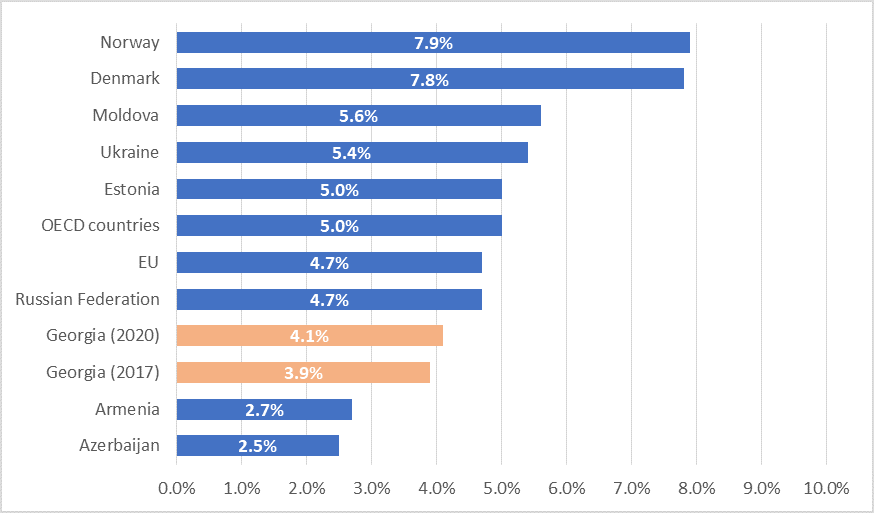
- Georgia Ranks 70th out of 78 countries by the summed-up score of reading, math and science.Additionally, according to the World Bank’s Human Capital Index (HCI), expected productivity among pupils is the lowest in Georgia, compared to the regional and developed countries.
- Teachers average salary in Georgia is lower by 40%, than the average salary in the county, and teacher’s profession is less attractive in Georgia. Therefore, the number of teachers is decreasing and the average age is increasing.
- 8,247 pupil dropped out of school in 2019/2020 study year. Although, elementary and basic education is mandatory in Georgia, half of the pupils who left the school were below the 10th grade.
- Vocational programs can’t meet all the needs of the labor market. Nearly half of pupils in the EU enroll in a vocational school after 9th grade, compared to the 1% in Georgia
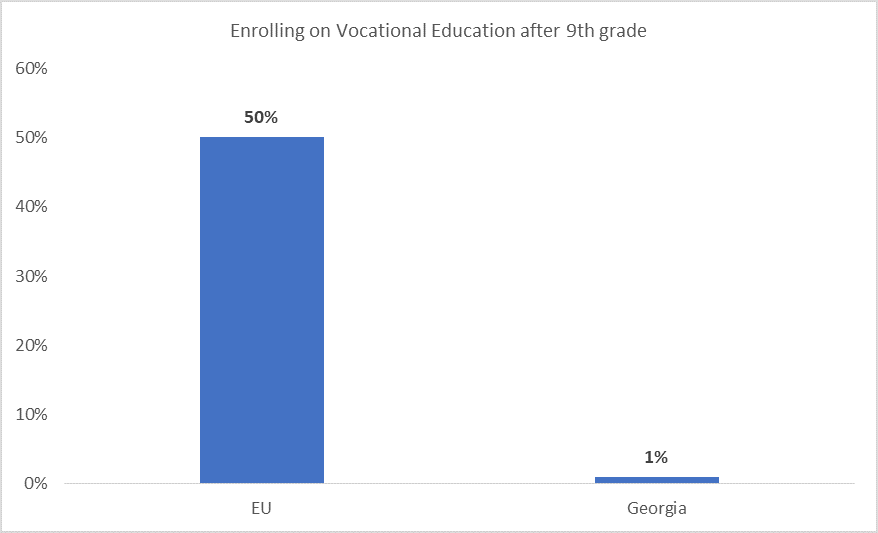
- Number of pupils in private schools was increasing with the economic growth, but a -6.2% decrease in GDP due to COVID-19 pandemic has reduced the number of pupils in private schools by -5%. Nearly 90% of pupils today, study in public schools.
- Distance learning in the Georgian education system was not implemented before the pandemic and the country was unprepared for the new challenge. 38% of households did not have a computer and 16% lacked internet access in 2020. While, 11% of total pupils and teachers had not used online study program TEAMS.
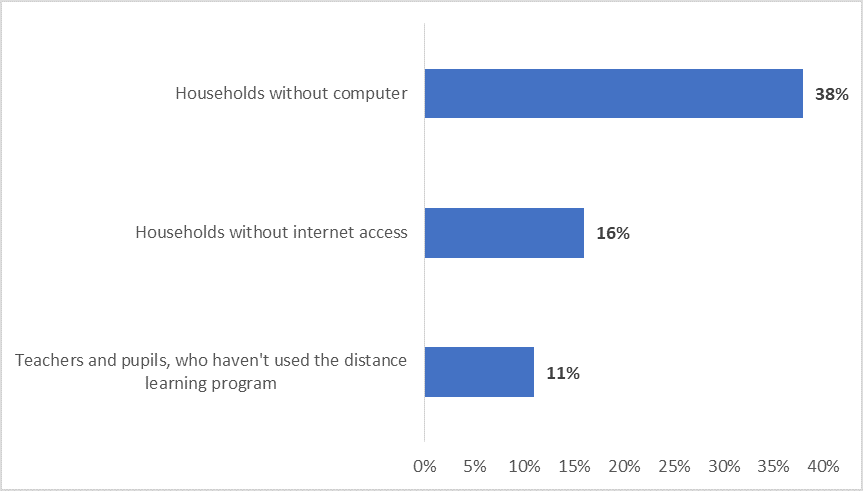
- Rural areas are facing tougher challenges than urban areas during the distance learning process. 68% and 26% of households in the rural areas did not had computers and lacked internet access, respectively. While, the share of households with the same problems in the urban areas was 24% and 9%, respectively, throughout the same period.
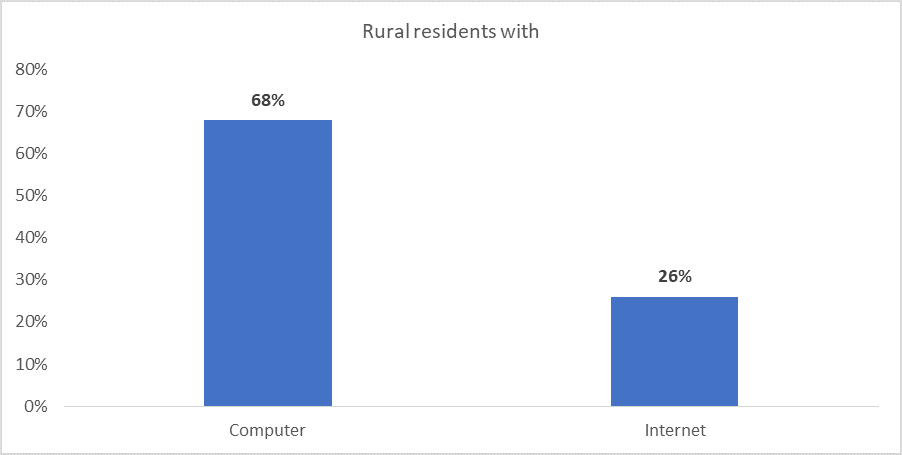
- 473 villages and up to 2,000 settlements are still waiting for access to high-speed internet, which should be granted under the “Universal Internetization Project” announced by the GoG in 2015.
- Rural areas are more dependent on classroom learning. Despite the risks of COVID-19 pandemic, 75% of pupils from regions returned to classrooms, in contrast to 46% of pupils living in urban areas.
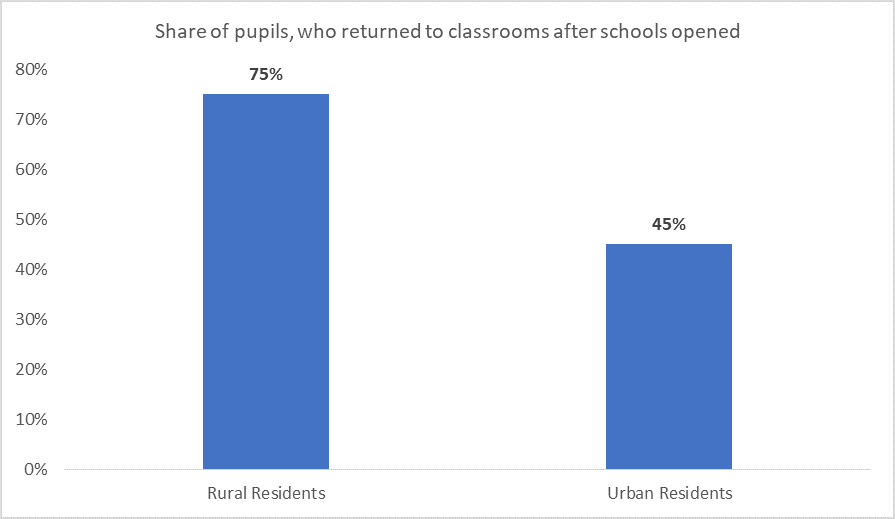
- We estimated, that Up to GEL 100 mln is needed to provide computers and internet to socially vulnerable families, in order to give them access to the online learning platforms.
- The present value of losses to the Georgian economy caused by the pandemic and deterioration of the learning process is estimated at GEL 55 Bln.
During the COVID-19 pandemic, Georgia is still unprepared for the distance learning and the quality of distance learning should be improved. In order to improve the effectiveness of learning, it’s important to develop relevant guidelines and give technical assistance to the socially vulnerable population. Therefore, it’s necessary to discuss this issue through various professional platforms, including the parliament of Georgia and urgently create an effective policy. Based on the current dynamics of the daily infections, the new academic year is expected to start via distance learning and without improving the present conditions, heavy losses are to be expected. Furthermore, it is essential to provide technical assistance to the socially vulnerable population, in order to provide basic conditions for learning.
/public/upload/Analysis/COVID-19 and the Georgian Education Sector ENG.pdf
The research was conducted in the scope of the project "Increase Efficieny of Public Services in the Georgia Education System" funded by the Open Society Foundations (OSF). The opinions expressed in this document belong to the Institute for Development of Freedom of Information (IDFI) and do not reflect the positions of Open Society Foundations (OSF). Therefore, OSF is not responsible for the content.